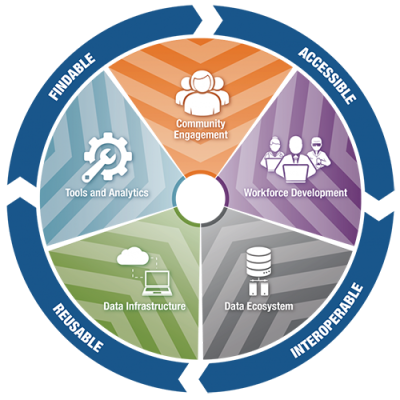Introduction to the FAIR Data Principles
The FAIR data principles are a set of guidelines aimed at improving the Findability, Accessibility, Interoperability, and Reusability of digital assets.
Originally published in 2016, these guidelines promote data management and sharing practices to ensure that scientific data can be effectively utilized to advance research and innovation. Reusing scientific data accelerates new scientific discoveries, saves money by decreasing duplication of efforts, and supports trustworthy, reproducible findings.
By adopting these principles, NIH and NIAID are paving the way for a more open and innovative research ecosystem that propels scientific discovery to improve public health.
Findability
Data should be easy to find for both humans and computers. This can be accomplished by assigning unique and persistent identifiers to data, describing data with rich, machine-readable metadata, and using discoverable data repositories/resources.
Accessibility
Once data is found, it should be retrievable by authorized users using standard protocols so it can be used in a secure and straightforward manner.
Interoperability
Data should be able to be integrated with other datasets and be analyzed, processed, and stored using applications or code. This requires the use of standardized data formats, vocabularies, and metadata. Interoperable data enables creation of large datasets that can be quickly analyzed using machine learning (ML) and artificial intelligence (AI) applications.
Reusability
Data should be well-described and curated so that it can be reused in future research. This involves the provision of clear usage licenses, detailed provenance information, and adherence to field- or community-specific data standards.
FAIR Data Principles at NIH and NIAID

Graphic depicting elements of the NIH Office of Data Science Strategy (ODSS) FAIR Data strategy.
The National Institutes of Health (NIH) has embraced the FAIR data principles to enhance the management and sharing of biomedical research data, maximize the impact of NIH-funded research, and foster a collaborative research environment.
The NIH Office of Data Science Strategy (ODSS) published the NIH Strategic Plan for Data Science, 2025-2030. The plan is designed to harness the power of data to accelerate biomedical discoveries and improve health outcomes. It aligns closely with the FAIR principles to ensure that data generated through NIH-funded research is findable, accessible, interoperable, and reusable.
The NIH Data Management and Sharing Policy outlines expectations for data management and sharing practices among NIH-funded researchers that align with FAIR data principles.
Find more NIH tools and resources related to FAIR data guidelines:
- Data Repositories: Find a list of NIH-supported data sharing repositories and guidelines for selecting a data repository.
- Common Data Elements: Review NIH common data elements to promote consistent data collection across studies.
- Data Sharing Policies: Visit the NIH Scientific Data Sharing website and NIAID’s Data Policy and Guidance page.
- NIH Cloud Resources: The STRIDES Initiative provides access to commercial cloud resources through vetted resellers. The NIH Cloud Lab provides on-ramps for learning to use cloud resources.
A closer look at FAIR data adoption
To facilitate data discovery and analysis, NIAID has developed the NIAID Ecosystem Discovery Portal, which uses metadata to search for infectious, allergic, and immune-mediated data across many data repositories. Other NIH Institutes and Centers have implemented similar tools, including the NIH Cloud Platform Interoperability (NCPI) Program, NCI Cancer Research Data Commons, NIH Heal Initiative, and NICHD Data and Specimen Hub (DASH).
NIAID is supporting ongoing efforts to improve data FAIR-ness in NIAID-funded data repositories to promote greater use of infectious, allergic, and immune-mediated data. This includes applying consistent metadata, adopting globally persistent identifiers, ensuring data is machine-readable using APIs, and more.
Metadata
NIAID has developed reusable metadata schemas, including fundamental and recommended metadata elements, to facilitate data discovery within NIAID-supported repositories. This is based on the schema.org framework. The schemas can be viewed on the NIAID Data Ecosystem Discovery Portal Schema page.
Identifiers
Persistent Identifiers (PIDs) are unique, stable alphanumeric strings assigned to digital resources for reliable long-term identification, regardless of location or changes. Several well-known examples are Digital Object Identifiers (DOI), a PID used to locate a specific digital object, such as a journal article; ORCiD, a PID for researchers; and ROR, a PID for research organizations.
APIs
An API is a set of rules that allows one software application to interact with another, enabling integration and data/metadata exchange. APIs enable quick data access, efficient sharing across platforms, and automated updates. The NIAID Data Ecosystem Discovery Portal has an API, as do NIAID-supported repositories such as TB Portals, ImmPort, IEDB, and others. Standardized APIs ensure consistent data access, resulting in a more robust, sustainable, and user-friendly data architecture that empowers researchers to leverage NIAID data more effectively.
Learn More
Visit the NIH Data Sharing website to learn more about data sharing principles and policies. Find additional information, trainings, and resources by visiting the GO FAIR website.
Related Information
Practicing Data Stewardship During Research
May 12, 2025Data stewardship refers to the responsible management and oversight of scientific data throughout its lifecycle, from creation and collection to storage, sharing, and preservation. It involves ensuring that data is accurate, accessible, and reusable, while also protecting its integrity and confidentiality. Good data stewardship is a collaborative effort throughout a NIH-funded project.

Understanding Metadata: A Key to Data Sharing and Reuse
March 14, 2025Metadata plays a crucial role in sharing and reusing scientific data. Understanding what metadata is and how it is used can accelerate your research, increase the visibility of your work, and advance the field of infectious and immune-mediated disease (IID) research.



